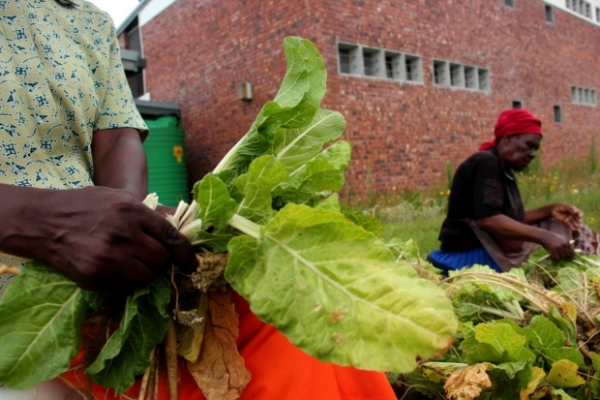

Volunteers for the Bambanani Vegetable garden harvest spinach. Photo by Masixole Feni (taken early 2014).
19 May 2015
It’s all smiles and happiness as five men and women go about their work at the Bambanani Food Garden. Project manager Theresa Falatsa explains that it is passion that drives them.
Started in 2010, the Bambanani Food Garden operates from the Nyameko Primary School in Mfuleni. Its main purpose is to promote healthy living for school children, by providing them with fresh vegetables.
“The project, Bambanani, was started in November 2007, where our main aim was to help the elderly living with HIV/AIDS. We provided care for them and we also ran a soup kitchen where we provided food to clinics for people living with the disease. Unfortunately, due to lack of funding, we had to close down the soup kitchen in 2010. Knowing what a huge role we played in the Mfuleni community, after the soup kitchen closed down, we decided to start a gardening project,” says Falatsa, who is 49 years old.
Falatsa says they approached Nyameko Primary School because it had a soup kitchen and it wasn’t far from where they lived and they would be able to help by providing vegetables for the meals cooked for the school children.
“We managed to get a five year lease agreement with the school to open Bambanani Food Garden, and we were so excited, because this meant that we could start working again,” says Falatsa.
The members of the project grow the vegetables and harvest them. For this they don’t get money. However, they earn a little by selling the vegetables to schools and members of the Mfuleni community. Falatsa works with four other people but says initially there were ten of them. Some decided to stop because they needed money, and they didn’t make much from selling the vegetables they collected.
One of the eldest members in the gardening group is 75 year old Jackson Nobanda, who because of his poor hearing speaks louder than the others. “Bambanani is a great project. As an old person, you need to keep yourself busy so that you don’t feel the aches and pains that come with old age. I love what I do and I have great knowledge in gardening because I used to garden when I was still a young man. We don’t get money from what we are doing but we enjoy it. We’ve had an incident before where cows came through the damaged school fence and ate our vegetables, but we recovered from that,” says Nobanda.
The garden has a number of vegetables at the moment including spring onion, beetroot, tomatoes and baby tomatoes, cabbage, spinach and green peppers. The gardeners received one week training from the Department of Agriculture before starting their garden. They also got support from Surplus People’s Project which provides them with material such as compost.
“All we want to do is to help our community live good healthy lives and if anyone wants to volunteer or contribute to our project, they can do so. We operate from the school four days a week from 8am to 12pm,” said Falatsa.